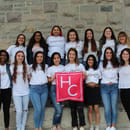“It explains it, but it doesn’t excuse it.” I read that quote while mindlessly scrolling through Instagram a few weeks after I turned 21. At that point I had no idea the lasting effect it would have on me, but looking back, it was that moment that made me reexamine my drinking.
Although I was in a pretty dark place, it wasn’t usually my intention to drink to numb anything, I was just a college student who wanted to have a good time like everyone else. But we often forget that alcohol is a depressant, and for me it would break down the walls that I used to hold back any issues that I usually just swept under the rug. I was a mess; I would turn what was supposed to be a fun night out into a disaster, becoming a huge burden to my friends. Thankfully I had a lot of good people in my life who looked out for me and made sure I was safe, but after too many nights like that they distanced themselves, and I don’t blame them. I was in denial for many months about my drinking, that because I wasn’t an alcoholic that I didn’t need to fix anything. Eventually I realized my problem wasn’t with alcohol, but what I was using the alcohol for. I couldn’t control how I would act when I was drunk, regardless of my intentions at the start of the night, and inevitably I would be a burden to the people I cared about.
Reading that quote, it hit me like a train that regardless of whether or not the excuses I had been making for myself were true, I had still done damage that I wasn’t taking responsibility for. So I decided to take advantage of my year at home and stop drinking altogether. I have currently been sober for just over six months, and I wanted to share what I’ve learned during that time for anyone else that is considering becoming sober.

- Everyone had their own opinion on what I was doing, and they were not all supportive
-
After telling the first few people in my life about my decision, I quickly decided to keep it to myself until this point because everyone had their own say on what I was doing. While I was lucky that most were positive, some were not, saying that I was doing it for attention or making too big a deal out of it, which made me question my motives. I realized that I had to stand firm in doing what I believed was best for me, even if it made other people uncomfortable.
- We depend greatly on alcohol in social situations and relationships
-
I never realized how ingrained the idea of drinking was into our daily social lives. People I would only see to go get drinks with were people I considered my friends. However, I quickly learned that your real friends aren’t who you go out with on Saturday night, but rather who you go to brunch with on Sunday morning or study with Tuesday afternoon. Taking alcohol out of the equation allowed me to see who really valued my company.
- Just because I wasn’t addicted doesn’t mean my drinking wasn’t causing serious problems
-
This was probably the most difficult thing for me to accept. I thought that because I could go days, weeks even, without drinking or even wanting to drink that I was fine. That because I didn’t wake up craving alcohol and it wasn’t affecting my grades that meant my drinking wasn’t an issue. It took me a long time to realize that my drinking was exacerbating existing issues that I was burying, and that by not dealing with my drinking I was also not dealing with those issues and often hurting myself or others in the process.
- While cutting it out entirely meant that I couldn’t drink in fun situations, it also ensured that I wouldn’t drink when I was upset
-
I tried for a while to do it halfway, cutting back and being more mindful when I chose to drink, which was an important step. However, that often meant I had a more difficult time stopping myself when I wanted to drink because I was upset. By choosing to cut out alcohol period, I had an incentive, a reason to not “break my streak,” which helped me especially on difficult days. I had to turn to other, healthier coping mechanisims and actually deal with what was upsetting me, rather than just ignoring it.
- Using a tracking app helped me stay conscious of my goals every day
-
Using the app “I Am Sober” allowed me to take a minute at the beginning and end of every day to remind myself what I was doing and why it was important. I could track my progress and see how far I’d come, which would inspire me to keep going. Also when I was feeling particularly vulnerable or tempted, I could check the app and see not only my progress, but the progress of many others who also used the app, and remind myself that I was not alone.
- I had to be open to re-evaluating myself
-
Keeping yourself in check and acknowledging when you start treating yourself and others poorly is a vital part of growth. It took a really long time for me to realize what I was doing and own up to my own harmful behavior, but I couldn’t start healing and moving forward until I did. This process also allowed me to keep a closer eye on some other unhealthy habits I had developed and helped me be more mindful of my daily treatment of myself and others.

All this to say, I want to make it clear that I don’t judge other people for drinking or have problems being around them when they do. This is something that I knew I had to do for my health and wellbeing, and I could not expect others to conform to my plans. Support comes in many forms, and drinking or not, I’m very lucky to have a lot of supportive people in my life. I do believe that it was easier for me to stop because I was at home doing my classes online, and not in a traditional college environment. That’s why I purposely started now, so that I would have a number of months under my belt when I did go back to school at some point, and I could be comfortable making the decision to drink again when I was ready.
At this point in my life, I don’t intend to be sober forever, but probably for the foreseeable future. My goal is to address the underlying issues I have that I used drinking to cope with, so that when I do start drinking again it’s for the right reasons and it doesn’t cause me or anyone around me harm. For anyone considering getting sober, or stopping any harmful habit, starting is the hardest part. While it takes a while to get easier, I have noticed so many positive changes in my life because I took this step, so many of which weren’t even related to drinking at all. I’ve become more mindful of my needs and feelings, addressing them rather than burying them, which has helped me move forward in so many aspects of my life.




